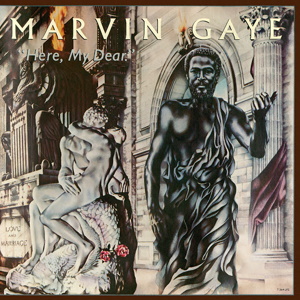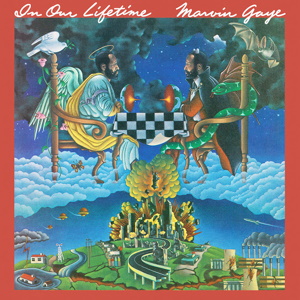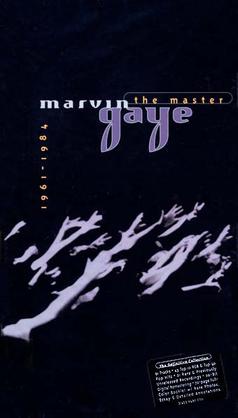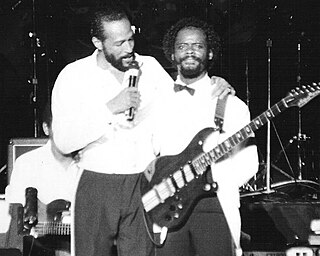Related Research Articles

Here, My Dear is the fifteenth studio album by American singer and songwriter Marvin Gaye, released as a double album on December 15, 1978, on Motown-subsidiary label Tamla Records. Recording sessions for the album took place between 1977 and 1978 at Gaye's personal studios, Marvin Gaye Studios, in Los Angeles, California. The album was notable for its subject matter focusing largely on Gaye's acrimonious divorce from his first wife, Anna Gordy Gaye.

The Andantes were an American female session group for the Motown record label during the 1960s. Composed of Jackie Hicks, Marlene Barrow, and Louvain Demps, the group sang background vocals on numerous Motown recordings, including songs by Martha Reeves & the Vandellas, the Temptations, Stevie Wonder, the Four Tops, Jimmy Ruffin, Edwin Starr, the Supremes, the Marvelettes, Marvin Gaye and the Isley Brothers, among others. It is estimated they appeared on 20,000 recordings.

"Got to Give It Up" is a song by American music artist Marvin Gaye. Written by the singer and produced by Art Stewart as a response to a request from Gaye's record label that he perform disco music, it was released in March 1977.
"Stubborn Kind of Fellow" is a 1962 song recorded by Marvin Gaye for the Tamla label. Co-written by Gaye and produced by William "Mickey" Stevenson, "Stubborn Kind of Fellow" became Gaye's first hit single, reaching the top 10 of the R&B chart and the top 50 of the Billboard Hot 100 in late 1962.

You're All I Need is the second studio album by soul musicians Marvin Gaye and Tammi Terrell, released in August 1968 on Motown-subsidiary label Tamla Records. Highlighted by three hit singles written by Nickolas Ashford and Valerie Simpson, You're All I Need was recorded throughout 1966 and 1967 and features two Top 10 Billboard Hot 100 hits, "Ain't Nothing Like the Real Thing" and "You're All I Need to Get By". It peaked at #60 on the U.S. Billboard 200 Album Chart. You're All I Need was the two singers' final collaboration effort, as Terrell would become ill following recording, before succumbing to a brain tumor in 1970.

In Our Lifetime is the sixteenth studio album by soul musician Marvin Gaye, released January 15, 1981, on Motown label Tamla Records. Recording sessions for the album took place at Marvin's Room in Los Angeles, California, Seawest Recording Studio in Honolulu, Hawaii, and at Odyssey Studios in London, England, throughout 1979 and 1980. The album cover was designed by Neil Breeden. Gaye's final album for Motown before leaving for Columbia Records, the album was the follow-up to the commercial failure of Here, My Dear, a double album which chronicled the singer's divorce from Anna Gordy. Entirely written, produced, arranged, and mixed by Gaye, In Our Lifetime was a departure for Gaye from the disco stylings of his previous two studio efforts and was seen as one of the best albums of the singer's late-Motown period.

Live at the London Palladium is a live double album by soul musician Marvin Gaye, released March 15, 1977, on Tamla Records. Recording sessions took place live at several concerts at the London Palladium in London, England, in October 1976, with the exception of the hit single "Got to Give It Up", which was recorded at Gaye's Los Angeles studio Marvin's Room on January 31, 1977. Live at the London Palladium features intimate performances by Gaye of many of his career highlights, including early hits for Motown and recent material from his previous three studio albums. As with his previous live album, Marvin Gaye Live!, production of the record was handled entirely by Gaye, except for the studio portion, "Got to Give It Up", which was managed by Art Stewart.
The Very Best of Marvin Gaye is the title of two compilations by Motown artist Marvin Gaye.

The Master (1961–1984) is a chronological box set album looking back at American R&B/soul Marvin Gaye's 23-year recording career. Spanning four discs, the box set goes over all portions of Gaye's career with a repertoire that spanned doo-wop, R&B, soul, psychedelic soul and funk with a mixture of themes including dance songs, love ballads, duets, socially conscious material, sensual material and autobiographical revelations. The set includes rarities such as a recorded 1983 live track of Gaye and Gladys Knight & the Pips each singing their seminal hit "I Heard It Through the Grapevine", Gaye's famed 1983 performance of "The Star-Spangled Banner" at an NBA All-Star game and an a cappella performance of "The Lord's Prayer" taped during Gaye's exile in Belgium.

Vulnerable is the third posthumous album by Marvin Gaye. Recorded in sessions throughout 1977, the album was a decade in the making, first being worked on in 1968 during sessions in New York with Bobby Scott. Reworked by Gaye a decade later, the album was originally going to be released in 1979 under the title, The Ballads, but was shelved. Two decades later, Motown released it under the title Vulnerable, including seven songs from the sessions and three alternate cuts.
"Anna's Song" is a song recorded by singer Marvin Gaye as part of his 1978 album, Here, My Dear. Recorded during the midst of Marvin and estranged wife Anna going through an acrimonious divorce, the song autobiographically depicted several parts of Marvin and Anna's past including one lyric that hints at his first hit single, "Stubborn Kind of Fellow" where Gaye says "What's it, husband, makes you so stubborn?". A memorable part of the song for Marvin's fans includes a verse where Marvin's vocals rise when singing Anna's name. Unlike most of the songs on the album with the exception of "Sparrow", this song was recorded in a jazzy atmosphere.
"Here, My Dear" is a song written, composed and produced by American soul singer Marvin Gaye, issued on the album of the same name in 1978. The song was a sort of introduction to the deeply confessional and post-divorce concept that gave a chronological look back at the tempestuous marriage between Marvin and first wife Anna. The lyric, You don't have the right to use a son of mine to keep me in line, became a memorable lyric for fans of Gaye and very much was a lyric attacking Anna for demanding alimony and child support payments to support then-twelve-year-old Marvin, III. Marvin then sarcastically told his wife that he dedicated the album to her but warned that she might "not be happy" and telling Anna "this is what you wanted" making a reference to the judge in their divorce case to give up royalties from this album to Anna. The song's musical background would be used for the song "Everybody Needs Love" from this album.
"Everybody Needs Love" is a 1977 song recorded by American soul singer Marvin Gaye, co-composed with "Let's Get It On" co-writer Ed Townsend. The song was issued on the singer's confessional 1978 album, Here, My Dear. Though most of the songs on the album were based on a mostly antagonistic view of Gaye's first wife, Anna Gaye, a few songs like this stood out which discussed how everybody needed love.
"Time to Get It Together" is a 1978 song recorded by Marvin Gaye and issued on Marvin's 1978 album, Here, My Dear. Much like "Everybody Needs Love", "Anger" and "A Funky Space Reincarnation", among others, this song doesn't discuss the demise of Marvin's marriage to Anna Gordy Gaye. Instead the song is a biographical account of the singer's own personal demons as he battled drug abuse, paranoia and depression.
"Falling in Love Again" is a 1977 song recorded by singer Marvin Gaye and issued on his 1978 album, Here, My Dear album. The song was another track on the personal album that did not discuss the demise of his first marriage. Instead of Anna Gaye, the song talked of the other woman in Marvin's life. Described in "You Can Leave, but It's Going to Cost You" as "that young girl", she was Janis Hunter, whom Gaye had married. In a solemn but still certain tone, he wanted to be sure that this time his love for Janis will be what he had always wanted. But as irony would have it, by the time of the album's release, Marvin and Janis' relationship was failing. By the end of the album's promotion, Janis had split from the singer after nearly two years as a married couple. They eventually divorced in February 1981. This song was the last song on Here, My Dear with a reprise from the album's "theme song", "When Did You Stop Loving Me, When Did I Stop Loving You", playing soon afterwards putting the album to a close for good.

Gordon Banks was an American guitarist, producer, writer and musical director. He was voted one of the top 100 guitarists in America by Rolling Stone magazine in 1985.
On April 1, 1984, American musician Marvin Gaye, who gained worldwide fame for his work with Motown Records, was shot and killed on the day before his 45th birthday by his father, Marvin Gay Sr., at their house in the Western Heights neighborhood of Los Angeles, California. Gaye was shot twice following an altercation with his father, after he intervened in an argument between his parents. He was pronounced dead on arrival at the California Hospital Medical Center. His father later pleaded no contest to a charge of voluntary manslaughter.
"Just Like" is a song recorded by Marvin Gaye in 1978 but not released until after the release of Gaye's posthumous 1985 album Romantically Yours.
Marvin Gaye was an American music artist and singer-songwriter who won acclaim for a series of recordings with Motown Records. Gaye's personal life, mainly documented in the biography, Divided Soul: The Life of Marvin Gaye, included his faith; child abuse by his father; personal relationships with his two wives, friends, and girlfriends; and bouts of depression and drug abuse.
Anna Ruby Gaye was an American businesswoman, composer and songwriter. An elder sister of Motown founder Berry Gordy, she became a record executive in the mid-to-late 1950s distributing records released on Checker and Gone Records before forming the Anna label with Billy Davis and her sister Gwen Gordy Fuqua. Gordy later became known as a songwriter for several hits including the Originals' "Baby, I'm for Real", and at least two songs on Marvin Gaye's What's Going On album. The first wife of Gaye, their turbulent marriage later served as inspiration for Gaye's 15th studio album, Here, My Dear.
References
- 1 2 Dave Simpson, "Marvin Gaye, Here, My Dear" (review), The Guardian, February 8, 2008.
- ↑ Who Sampled.